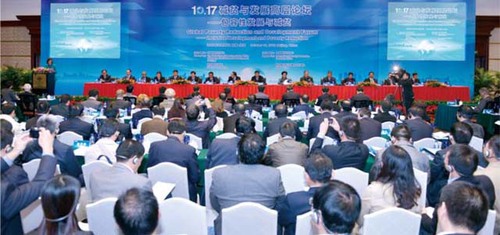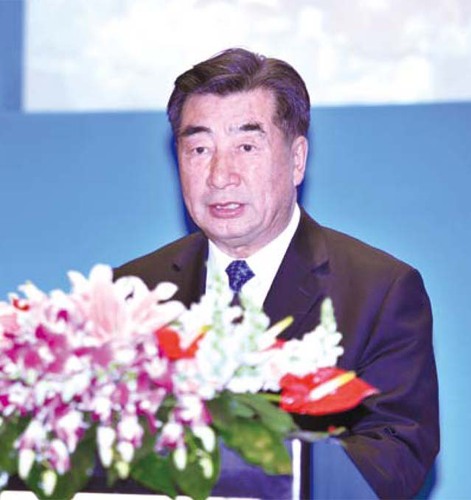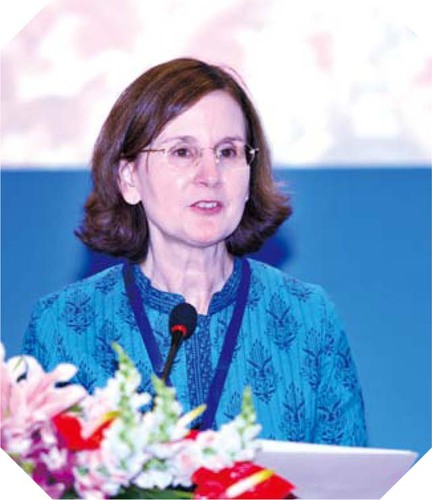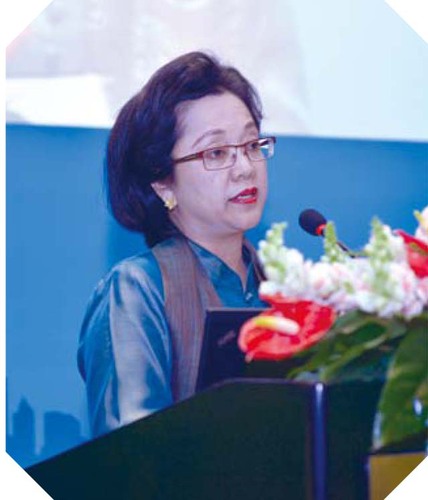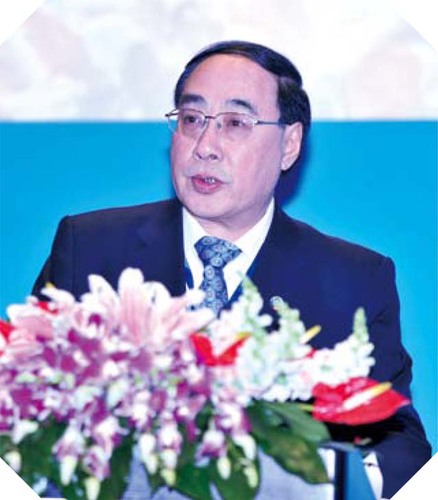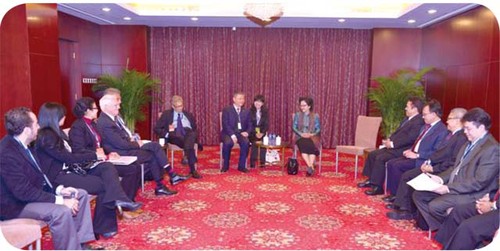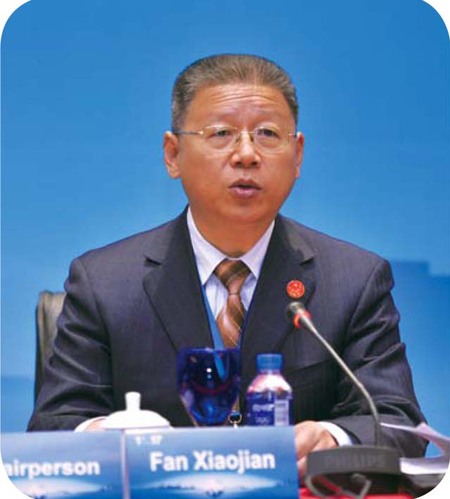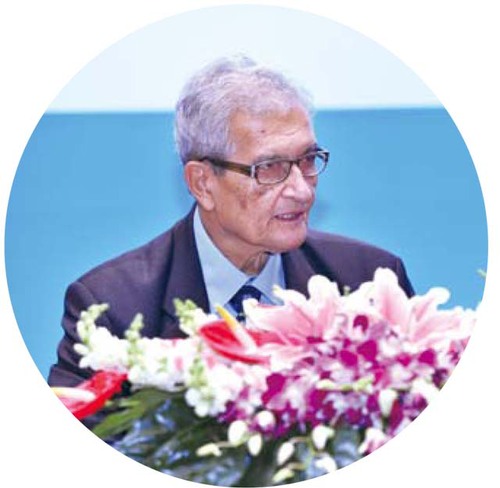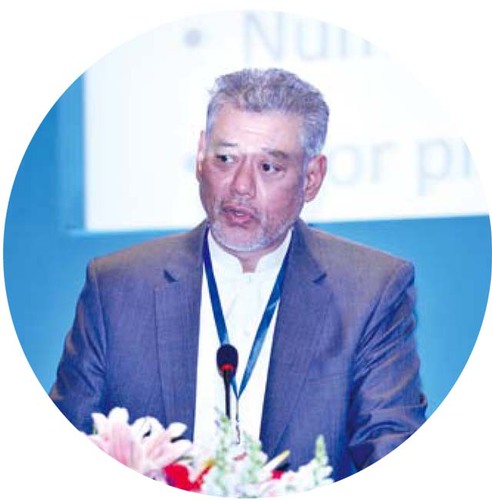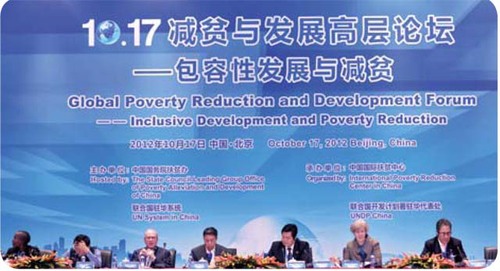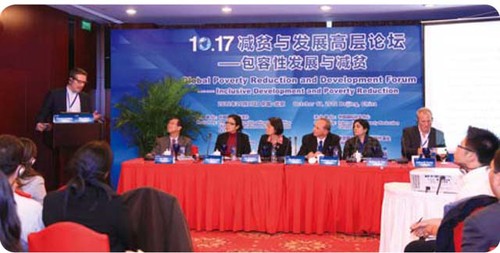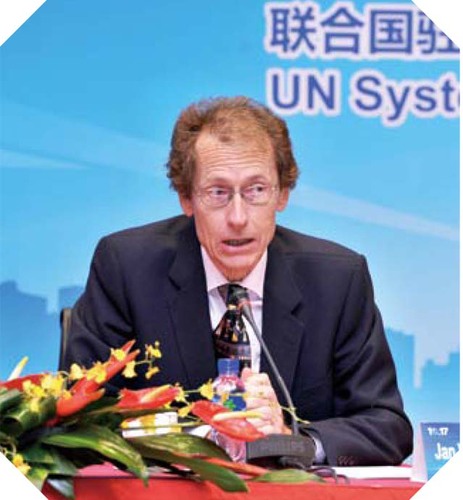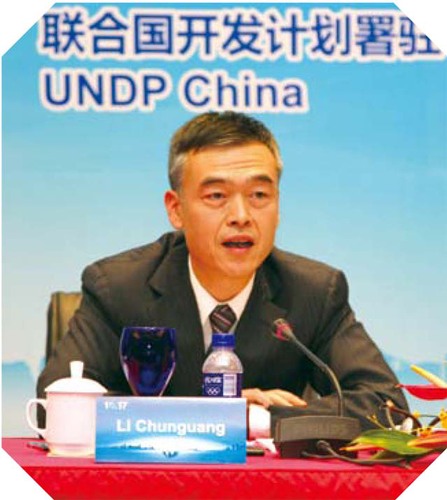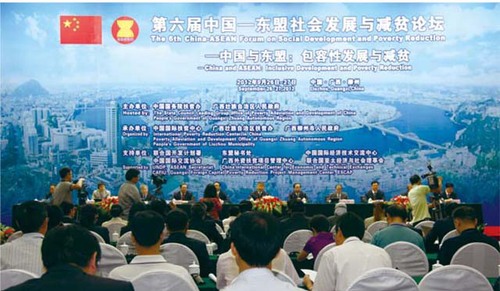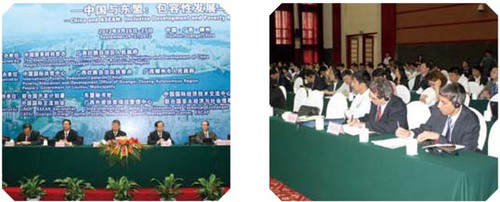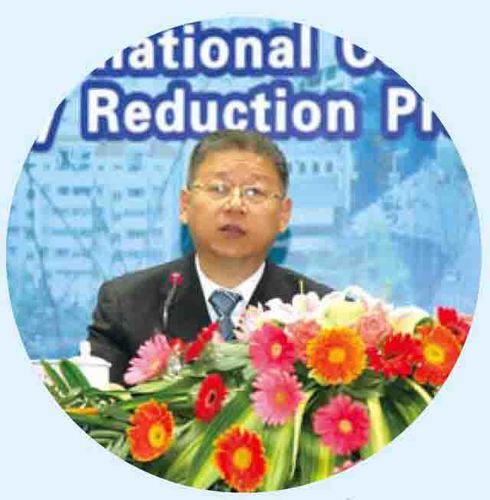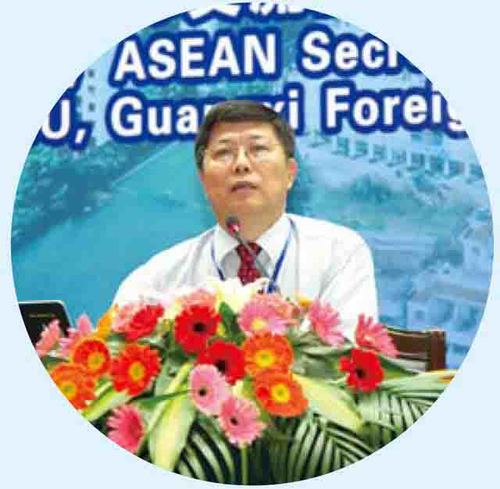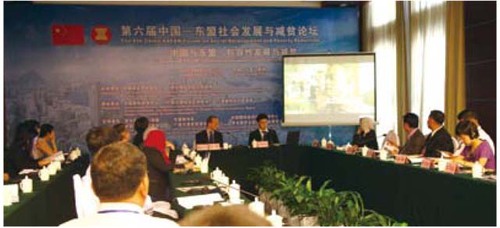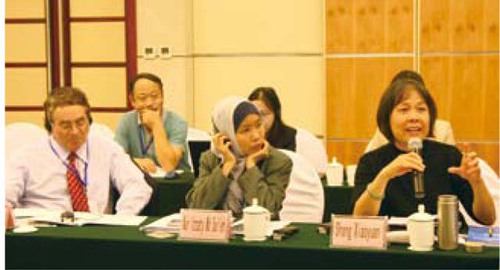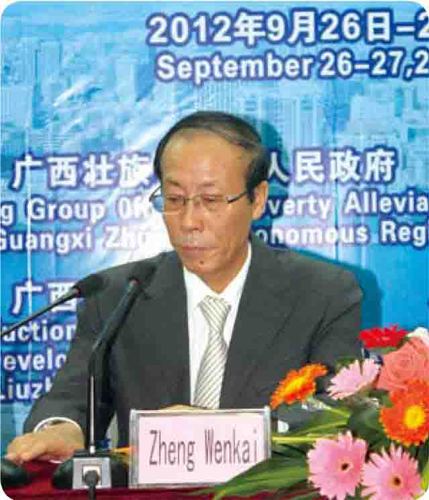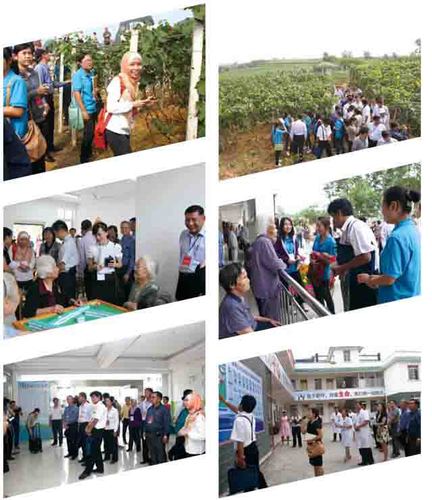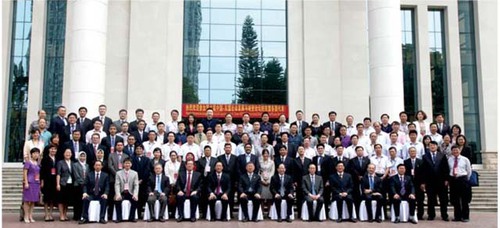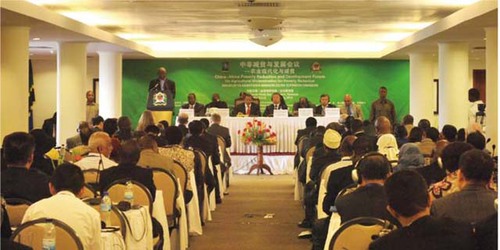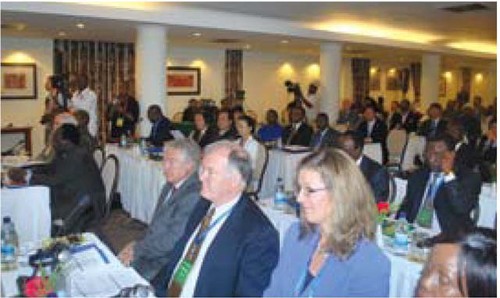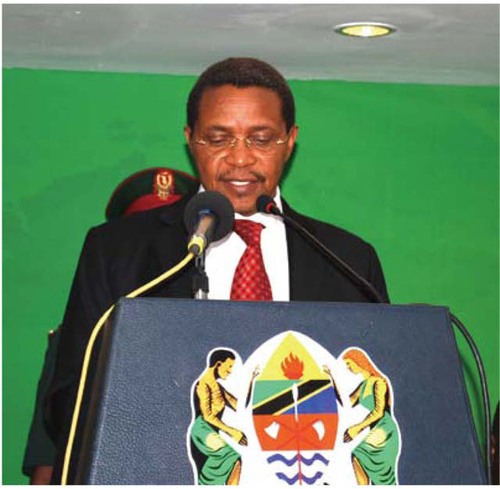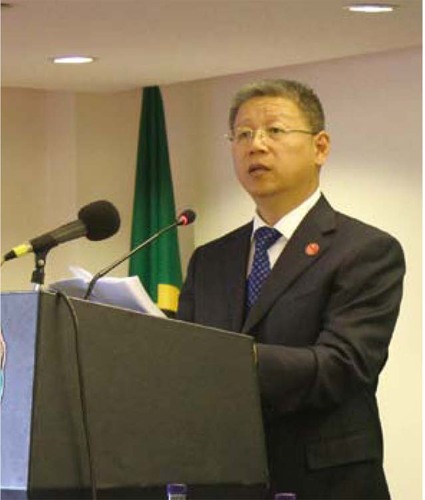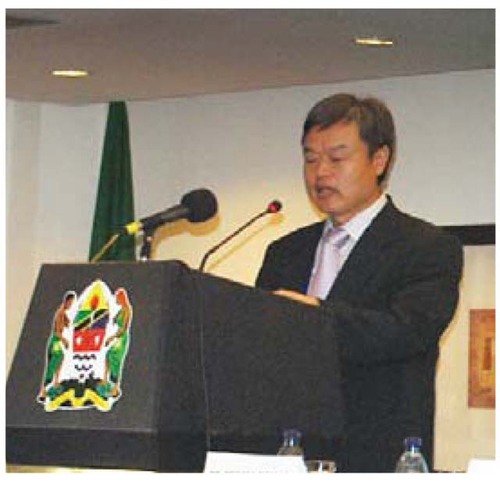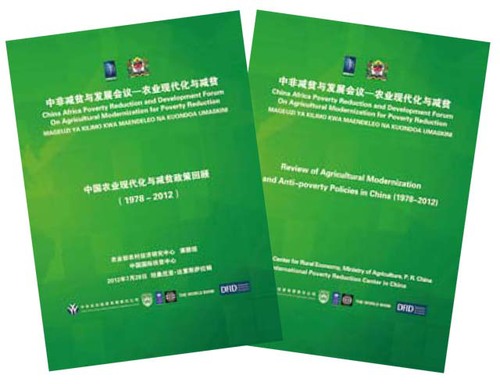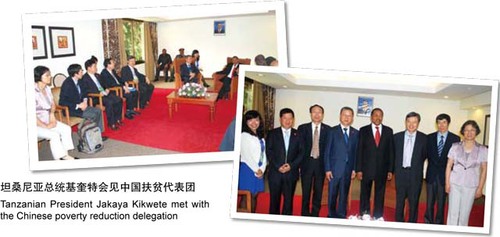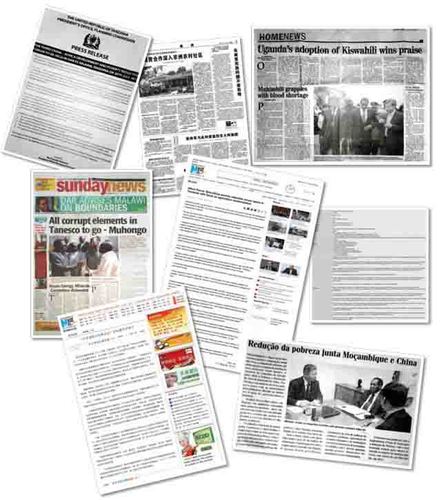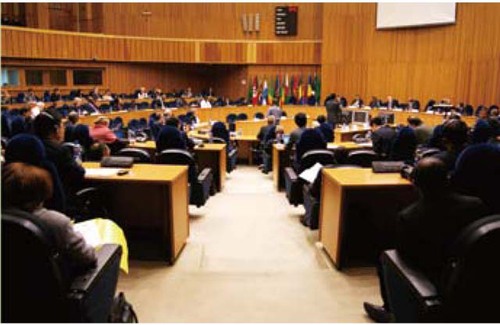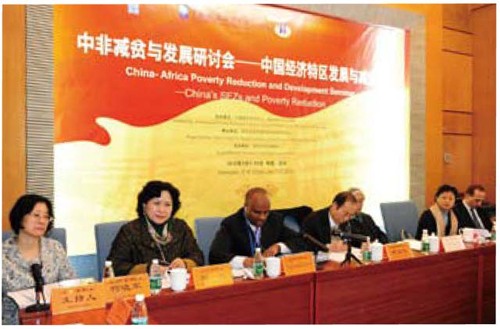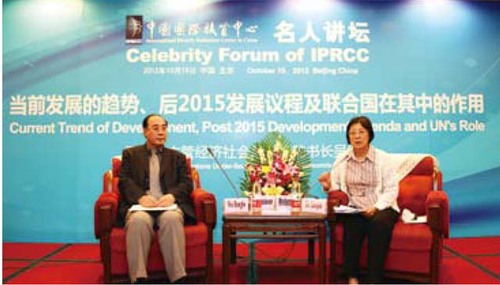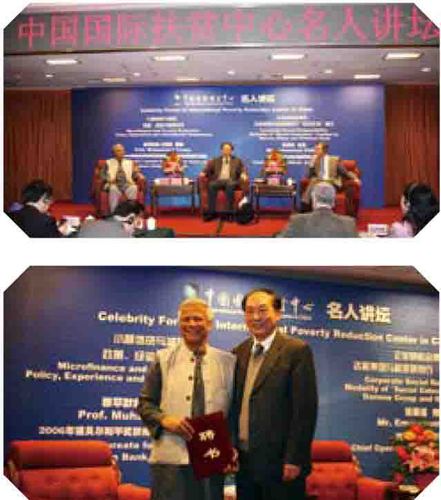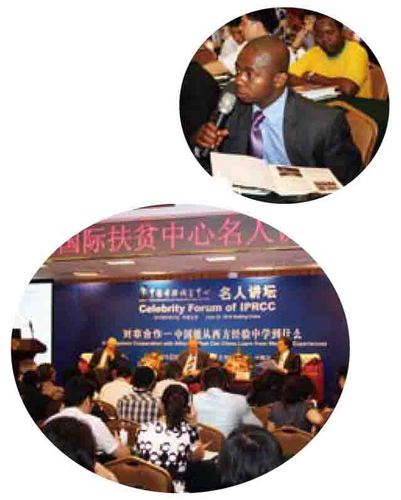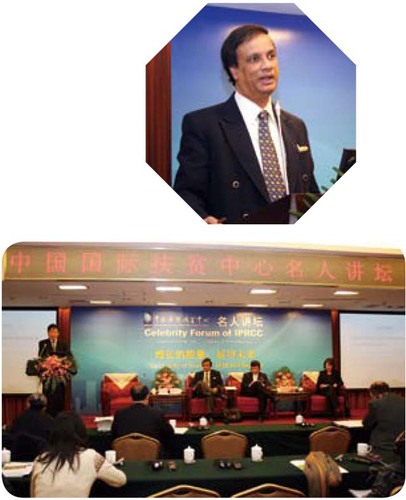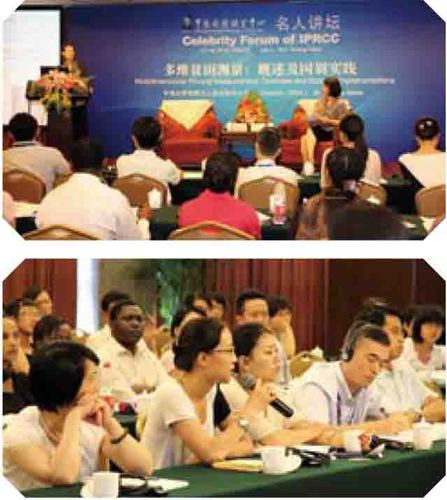2012 IPRCC Exchange of Briefing
Opening Ceremony
Panel Discussion
The transformation of poverty reduction and inclusive development.
Opening Ceremony
The 6th China-ASEAN Forum on Social Development and Poverty Reduction was held in Liuzhou, Guangxi on
September 26-27, 2012. With the theme of “China and ASEAN: Inclusive Development and Poverty Reduction” that aimed to discuss emerging problems of vulnerable groups amid rapid social development and share successful experience in addressing them, the Forum was hosted by China’s State Council Leading Group Office of Poverty Alleviation and Development (LGOP) and People’s Government of Guangxi Zhuang Autonomous Region. Six topics of the Forum were narrowing development gap for poverty reductions, industrial and technology transfer for poverty reduction, trade facilitation and micro-finance for poverty reduction, social protection for poverty reduction, poverty reduction in urbanization process, and poverty issues of special groups. The Forum attracted more than 100 delegates from China and ASEAN government bodies, research institutions, media, enterprises and international organizations including UNDP and UNESCAP.
Mr. Fan Xiaojian, Director (Minister) of LGOP, Mr. Wei Chao’an, Deputy Secretary of Communist Party Committee of Guangxi Autonomous Region, Mr. Nguyen Minh Tien, Deputy-Director of Department of Rural Development, Ministry of Agriculture and Rural Development of Vietnam and representative of Senior Officials Meeting on Rural Development and Poverty Eradication (SOMRDPE), Mr. Ye Qingxing, Director-General of Rural Economy Research Department of State Council Research Office, and UNDP China Country Director Mr. Christophe Bahuet addressed the opening ceremony.
Mr. Fan Xiaojian, Director (Minister) of LGOP, mentioned in his opening remark that since the 1st China-ASEAN Forum on Social Development and Poverty Reduction was successfully held in Nanning and the launch of “Nanning Initiative” in 2007, the Forum has served as a knowledge-sharing platform where people exchange poverty reduction policies and experiences. Poverty reduction cooperation has now been officially included in the Plan of Action to Implement the Joint Declaration on CHINA-ASEAN Strategic Partnership for Peace and Prosperity (2011-2015), and the China- ASEAN Forum has become an institutional forum with significant international influence.
Keynote Speeches
Mr. Tang Min, the State Council Counsellor and Vice President of Youcheng Social Entrepreneur Foundation,
delivered a keynote speech entitled “Public Policies for Inclusive Development and Poverty Reduction”. Referring to the Outline for Development-Oriented Poverty Reduction for China’s Rural Areas (2010- 2020) released by the Chinese government in 2011, Mr. Tang highlighted that the Outline has specified its new policy goals that provide a solid policy foundation and a macroeconomics environment for poverty reduction efforts. These new policy goals are to obtain bigger achievements, to speed up poverty alleviation, to improve ecological environment, to enhance the development capacity, and to narrow the development gap.
The UNDP expert Mr. Peter Chaudhry stressed in his keynote speech that the vulnerability of the ethnic minorities, especially minority difference and diversities, should be taken into account in poverty reduction work and avoid the ‘one-size-fits-all’ programmes. Providing continued financial support, investing in data and research, improving health care and education, establishing decentralized and participatory models of development assistance, investing in infrastructure, and promoting market access and rural enterprise development are the key ways of enhancing the prospects for the ethnic minority development.
Parallel Sessions
Two parallel sessions were hosted surrounding the six discussion topics: narrowing development gap and poverty reductions, industrial and technology transfer and poverty reduction, trade facilitation and micro-finance in poverty reduction, social protection and poverty reduction, poverty reduction and urbanization process, and poverty issues of special groups.
Mr. Ryan Hardin, Analyst of Performance and Management Delivery Unit of Malaysian Prime Minister’s Department, introduced Malaysian Rural Development Framework-Government Transformation Programme (2013-2015) to the delegates. The programme aims at livable rural environment, vibrant economy and good income level that youth finds attractive to live and work with, by investing in rural basic infrastructure and building 21st century villages pillared on agriculture, tourism, plantations and cottage industry.
Ms. Shang Xiaoyuan, Professor at Beijing Normal University and Senior Researcher at the University of New South Wales in Australia, presented on China’s welfare policy for children at the Parallel Session B.
Concluding Session
Mr. Zheng Wenkai, Deputy Director(Vice Minister) of LGOP pointed out in his conclusion remarks, that this Forum had an in-depth analysis on the relationship between inclusive development and poverty reduction, a comprehensive discussion on the impact of trade facilitation on poverty, as well as constructive suggestions on feasible measures to accomplish inclusive development. Poverty reduction is the mutual challenge faced by China and ASEAN countries on their development paths, therefore there is significant importance for enhancing the exchange and cooperation between China and ASEAN countries.
Field Visit
Field visits to pilot projects on social development and poverty reduction in Liuzhou were arranged, including Liuzhou Industrial Museum, the Lubi grape base in Liujiang County, the nursing home and the health centre in Liunan District.
Theme Report of the Forum
● China-ASEAN Relationship with the Background of Inclusive Development
● The Pro-Inclusive-Development Public Policy ------ China’s Experience
● Ethnic Minorities Development ------ Case Studies of China, Laos and Vietnam
● Trade Facilitation and Poverty Reduction ------ the Empirical Study on China and ASEAN Countries
● The Great Mekong Sub-region Promotes Trade Facilitation and Microfinance to Enhance Poverty Reduction ------ Case of Thailand
● The Impact of Trade Facilitation on Indonesian Export-oriented SMEs
The China-Africa Poverty Reduction and Development Forum
Opening Ceremony
On July 28, 2012, The China-Africa Poverty Reduction and Development Forum was opened in Dar-es-Salaam, the capital of Tanzania. H.E. Mr. Jakaya Kikwete, President of the United Republic of Tanzania, and Fan Xiaojian, Deputy Head of the State Council’s Leading Group of Poverty Alleviation and Development and Minister of the Leading Group Office of Poverty Alleviation and Development attended and addressed the opening ceremony. Government officials and scholars from China and Africa, together with more than 120 representatives from UNDP, the World Bank, DFID, etc. were present at the meeting. More than 20 ministerial-level delegates from Tanzania, Ghana, Kenya, Eritrea, Mauritius, Uganda, Sierra Leone and Mauritania, Rural Economy and Agriculture Commissioners of the African Union, and senior representatives with Southeast African Organizations also attended the conference as well.
In his opening speech, H.E. Mr. Jakaya Kikwete said that China-Africa Poverty Reduction and Development Forum,which was held at the end of the 5th Ministerial Meeting of China-Africa Cooperation Forum, could never be too timely, as it is of great significance to implement the decisions and initiatives taken and established by the meeting.
He said that 70% of sub-Saharan Africans live in rural areas and follow the traditional agricultural practices. The low productivity and yield make rural poverty and food insecurity pre-eminent issues. In that case, African countries have expressed a strong political will and are better prepared to realize agricultural modernization without any delay.
He noted that to achieve this goal, Tanzania needs to cooperate with China, and draw upon the extensive experience China has accumulated in poverty reduction and development. Meanwhile, China is ready and willing to facilitate Africa’s agricultural transformation, improve its infrastructure, and conduct agricultural R&D and training of the related personnel.
He also pointed out that with a population of 1.3 billion, China is an important market for African’s agricultural products. China’s private sector can establish manufacturing enterprises in cooperation with Tanzania. And Tanzania hopes to access the Chinese market via this event.
Fan pointed out that, China and African countries remain at the same development stage, and share common goals in promoting development and eliminating poverty. For a long time, China and African countries have been actively exploring development approaches in seeking national prosperity and pursuing happiness, with remarkable achievements accomplished in stimulating growth, accelerating poverty reduction and pushing forward social progress. He said that agricultural and rural development constitutes an important basis for growth and poverty reduction. With a view to improving the capacity and level of agricultural policy-making, agricultural infrastructure
construction and agricultural technology research and extension, and realizing poverty reduction through agricultural
modernization, this event will be of particular significance in advancing agricultural growth and rural development of both Africa and China.
Chinese Ambassador to Tanzania H.E. Mr. Lv Youqing expressly pointed out in his opening address that during the just-concluded 5th Ministerial Meeting of China-Africa Cooperation Forum, President Hu Jintao had announced, on behalf of the Chinese government, five key areas to endorse peace and development of Africa and promote the new China-Africa strategic partnership. The China-Africa Poverty Reduction and Development Forum held in Tanzania this year marks a concrete action take by both sides to implement the spirit of the said ministerial meeting, symbolizing that China-Africa and China-Tanzania communication and cooperation on poverty reduction and development has entered a new phase.
Topics
● Overview of Agricultural Modernization and Poverty Reduction
● Agricultural Policies and Policy Development Process
● The Role of Agricultural Infrastructure Construction and Agricultural Technology Research and Extension in Promoting Agricultural Modernization
● The Role of Agricultural Industrial Chain and Farmers’ Organization in Promoting Agricultural Modernization
● The Way Forward for Agriculture Development in Africa and How it Could Benefit From South-South Cooperation
Keynote Report: Review of Agricultural Modernization and Anti-poverty Policies in China (1978-2012)
Side Events
Tanzanian President Jakaya Kikwete met with the Chinese poverty reduction delegation
Voice of Participants
AU Commissioner for Rural Economy and Agriculture H.E Tumusiime Rhoda Peace says the theme of the forum, which echoes the CAADP now being implemented, reflects the spirit of South-South Cooperation.
Deputy Director General of Promotion of Private Sector, Ministry of Economic Affairs and Development of Mauritania Mr. Mohamed Yahya Taleb Ahmed is a first-time participant of the forum, which in his eyes is a good platform for sharing poverty reduction experience.
Deputy Minister for Finance and Economic development of Sierra Leone Mr. Momodu Kargbo points out that the development of economy cannot go without the development of agriculture, and poverty reduction also needs to rely on agricultural development and rural productivity improvement. He emphasizes the significance of agriculture-led poverty reduction cooperation between China and Africa within the South-South cooperation framework. Rather than taking resources away, cooperation on poverty reduction leaves practical technologies and precious experiences on the soil of Africa.
Media Coverage
Previous Events
The “China-Africa Poverty Reduction and Development Conference” was held from November 1 to 2, 2011 in Addis Ababa, Ethiopia. The conference brought together 250-odd participants, including Meles Zenawi, Prime Minister of Ethiopia, Mr. Zheng Wenkai, Deputy Director of LGOP and Ms. Helen Clark, UNDP Administrator.
From January 7 to 13, 2012, the “China-Africa Seminar on Poverty Reduction and Development”was held
in Shenzhen, with the participation of more than 50 representatives, including Mr. Zheng Wenkai, Deputy Director of LGOP, Hailemeskel Tefera, Urban Development and Construction State Minister of Ethiopia.
Celebrity Forum
Introduction
As a series of events, the Celebrity Forum turns into a branded event for IPRCC to promote poverty reduction and
social development. It encourages knowledge sharing, information dissemination and experience exchange by inviting celebrities with remarkable achievements and experience in the sphere of poverty alleviation and social development to deliver speeches. The purpose is to highlight hot and frontier poverty issues, to introduce advanced development ideologies and strategies, and finally, to explore models that could promote the development of poverty alleviation in developing countries.
7 sessions have been successfully held for the Celebrity Forum by IPRCC since its 2009 launch.
The Latest Forum
The 7th IPRCC Celebrity Forum was held in Beijing on the morning of October 19th, 2012. Mr. Wu Hongbo, United Nations Under-Secretary-General for economic and social affairs was invited to give a speech titled “Current trend of development, post 2015 development agenda and UN’s role”. Ms. He Xiaojun, Deputy Director-General of IPRCC, hosted the forum. Mr. Wu introduced main features and roles of UN, the world’s largest intergovernmental agency, and explained current situation and challenges of global development agenda. He stressed that four basic factors should be considered in future development agenda: inclusive economic development, inclusive social development, sustainable environment and peace and security.
Previous Events
The First Forum
On March 11th, 2009, Professor Muhammad Yunus, 2006 Nobel Peace Laureate, Chairman of the Grameen Bank in Bangladesh, and Mr. Emmanuel Faber, Chief Operational Officer of Danone Group, delivered speeches titled “Microcredit and Social Business for Poverty Reduction”and “Enterprises’Social Responsibility: Danone Group and Grameen Bank’s Social Business Model” at the IPRCC’s Celebrity Forum held in IPRCC office. More than 150 participants from the China State Council Leading Group Office of Poverty Alleviation and Development(LGOP) and other ministries, Chinese research institutions, and international organizations attended the forum. Mr. Liu Jian, Chairman of IPRCC Board of Trustees hosted the event.
The Second Forum
On April 1, 2009, the second Celebrity Forum was held. Dr. Ardo Hansson, Chief of the Economics Unit and lead
economist for the World Bank China Office, delivered a lecture themed “The World Bank’s Strategies and Initiatives on South-South Cooperation”, And Dr. Hans P. Binswanger-Mkhize, a senior expert of the World Bank and Honorary Professor of Tshwane University of Technology (South Africa) was also invited to deliver a speech themed “The Changing Context and Prospects for Agriculture and Rural Development in Africa”.
The Third Forum
On the morning of June 22, 2010, the 3rd IPRCC Celebrity Forum was held in Beijing. Robert Kappel, President of German Institute of Global and Area Studies (GIGA) and Graham Meadows, former Director-General of the Regional Policy Directorate-General of the European Commission (EC), were invited to attend the forum. They delivered two keynote speeches respectively titled“Development Cooperation with Africa – What Can China Learn from Western Experiences” and “Policy for Economic Development: Search for the X Factors”. Nearly 100 representatives from the State Council Leading Group Office of Poverty Alleviation and Development (LGOP), various units directly under the LGOP, relevant international organizations and research institutions attended the forum.
The Forth Forum
The 4th IPRCC Celebrity Forum was held in Beijing on the morning of July 21, 2010. Ms. Deborah Brautigam, Professor of International Development at American University and well-known expert on China affairs, was invited to attend the forum and deliver a keynote speech entitled “The Dragon’s Gift: The Real Story of China in Africa”. About 100 representatives from the State Council Leading Group Office of Poverty Alleviation and Development (LGOP) and various units directly affiliated to LGOP, embassies of relevant foreign countries in China, international organizations, and research institutions were present at the forum.
The Fifth Forum
On November 17, 2010, the 5th IPRCC Celebrity Forum was held in Beijing. Mr. Vinod Thomas, Senior Vice-President of the World Bank and Director-General of the Independent Evaluation Group (IEG) of the World Bank Group, and Ms. Wang Yan, Senior Economist of the World Bank were invited to attend this forum and delivered keynote speeches respectively titled “Quality of Growth: Improving Growth Benefits through Financial Policies” and “Country-specific Experience: Brazil, Chile and China”. Around 100 representatives from different research institutes, the State Council Leading Group Office of Poverty Alleviation and Development (LGOP), various units affiliated to LGOP, relevant international organizations and foreign embassies in China attended the forum.
The Sixth Forum
The sixth IPRCC celebrity forum was held in Beijing, July 5th, 2011, with the theme of “multi-dimensional poverty measure: a brief introduction and national practices”. Dr. Sabina Alkire, Director of the Research Centre of Oxford Poverty and Human Development Initiative (OPHI) was invited to deliver a speech. More than 70 representatives from the State Council Leading Group Office of Poverty Alleviation and Development (LGOP), various units affiliated to LGOP, research institutes, relevant international organizations and foreign embassies in China attended the forum. Dr. Sabina Alkire explained the concept, measurement, applied range and key factors in practices.

扫描下载手机客户端
地址:北京朝阳区太阳宫北街1号 邮编100028 电话:+86-10-84419655 传真:+86-10-84419658(电子地图)
版权所有©中国国际扶贫中心 未经许可不得复制 京ICP备2020039194号-2

